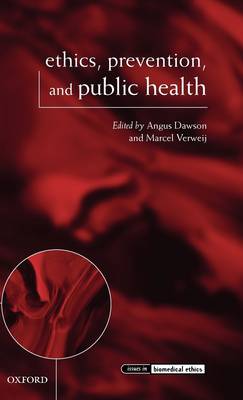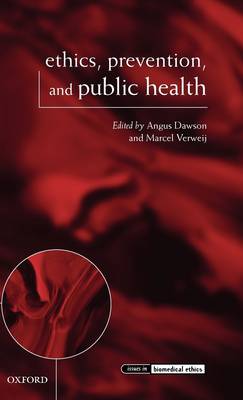
- Afhalen na 1 uur in een winkel met voorraad
- Gratis thuislevering in België vanaf € 30
- Ruim aanbod met 7 miljoen producten
- Afhalen na 1 uur in een winkel met voorraad
- Gratis thuislevering in België vanaf € 30
- Ruim aanbod met 7 miljoen producten
Zoeken
Ethics, Prevention, and Public Health
€ 193,45
+ 386 punten
Omschrijving
Public health is an important and fast-developing areas of ethical discussion. In this volume a range of issues in public health ethics are explored using the resources of moral theory, political philosophy, philosphy of science, applied ethics, law, and economics. The twelve original papers presented consider numerous ethical issues within public health ethics. To what extent can the public good or the public interests justify state interventions that impose limits upon the freedom of individuals? What role should the law play in regulating risks? Should governments actively aim to change our preferences about such things as food, smoking or physical exercise? What are public goods, and what role (if any) do they play in public health? To what extent do individuals have moral obligations to contribute to protecting the community or the public good? Where is it appropriate to concentrate upon prevention rather than cure? Given the fact that we cannot be protected from all harm, what sorts of harm provide a justification for public health action? What limits do we wish to place upon public health activities? How do we ensure that the interests of individuals are not set aside or forgotten in the pursuit of population benefits?
Specificaties
Betrokkenen
- Uitgeverij:
Inhoud
- Aantal bladzijden:
- 248
- Taal:
- Engels
- Reeks:
Eigenschappen
- Productcode (EAN):
- 9780199290697
- Verschijningsdatum:
- 15/03/2007
- Uitvoering:
- Hardcover
- Formaat:
- Ongenaaid / garenloos gebonden
- Afmetingen:
- 147 mm x 221 mm
- Gewicht:
- 421 g

Alleen bij Standaard Boekhandel
+ 386 punten op je klantenkaart van Standaard Boekhandel
Beoordelingen
We publiceren alleen reviews die voldoen aan de voorwaarden voor reviews. Bekijk onze voorwaarden voor reviews.










